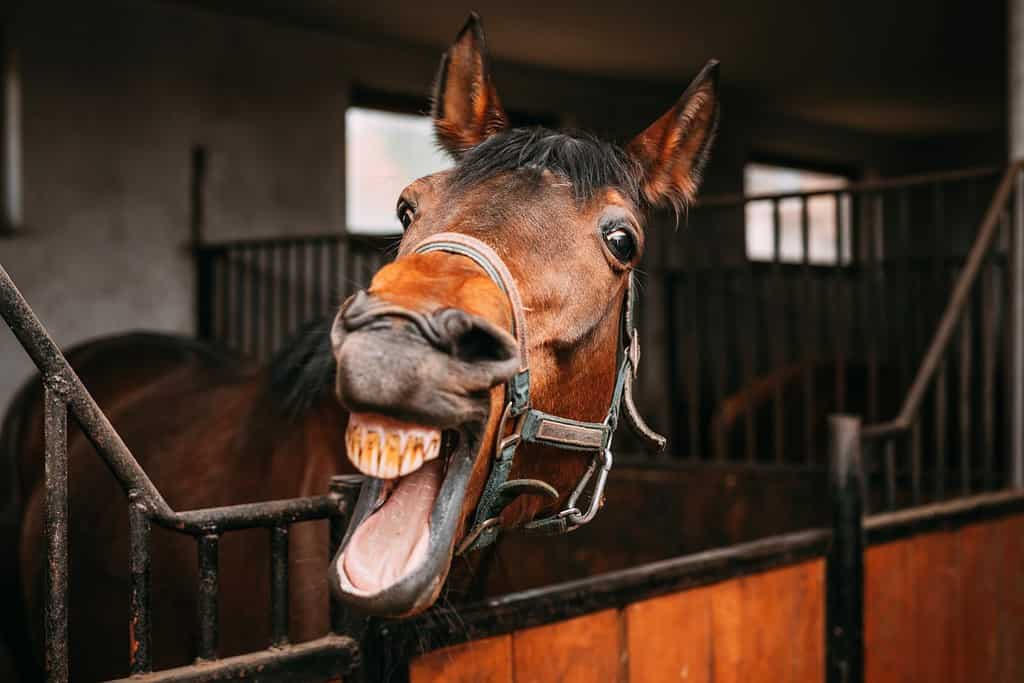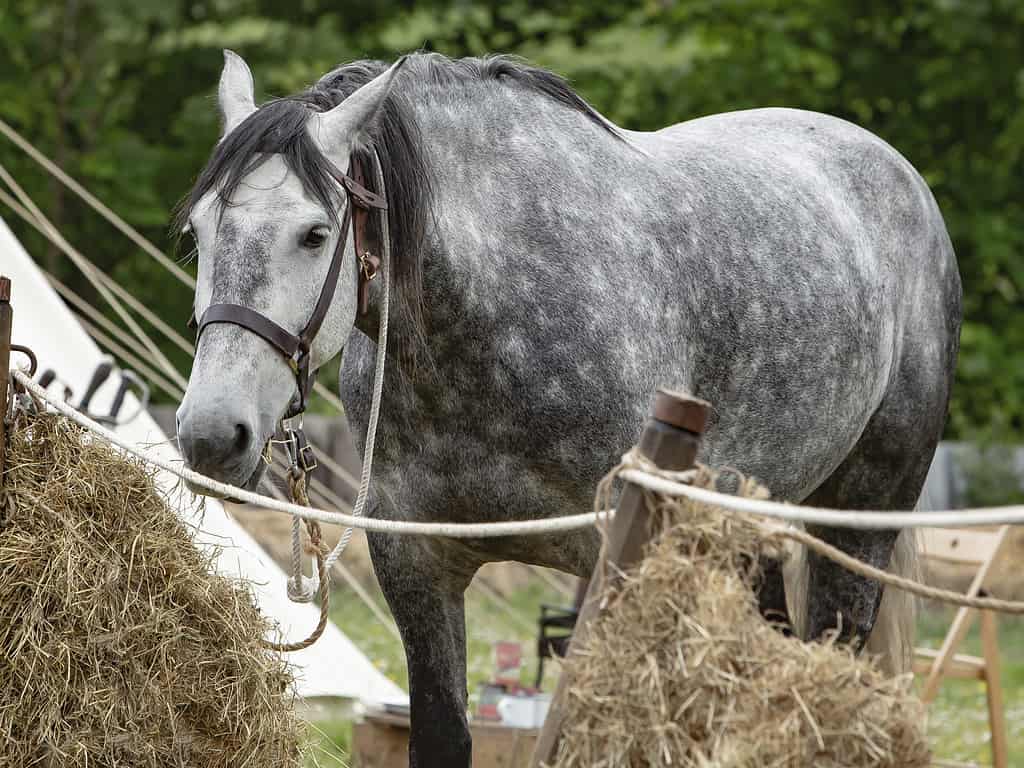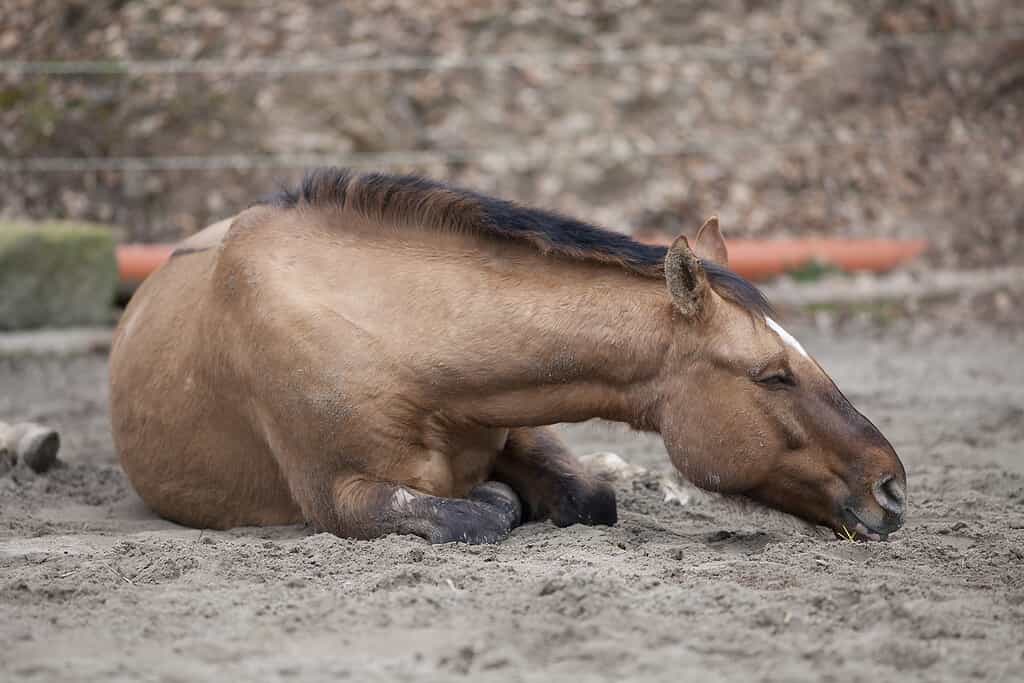Humans (are supposed to) go to the dentist every six months for a routine check-up. Horses are the same! These visits are preventative oral examinations that keep potential dental problems at bay. When a dentist spots an issue then they correct it. For human teeth, this is called restoration and for horse teeth, it’s called floating. Let’s learn more about the horse teeth floating procedure, how to know when it’s time to schedule a float for your equine, and the average cost.
Horse Teeth 101

A horse’s teeth are made of enamel that gets worn away as they eat.
©stock1000/Shutterstock.com
But before we get into the details of horse teeth floating, it’s a good idea to have a basic grasp of horse teeth and equine eating habits.
Like other species whose diet consists of roughage — such as cows and rabbits — horses’ teeth continue to come in throughout their lifetime. Plus, their teeth are made of enamel, which wears away as they munch on this roughage all day.
That isn’t the issue though. The issue is that they continuously chew in a circular motion, which wears the enamel away unevenly and creates sharp points over time. That’s when it’s time to float their teeth.
What is Horse Teeth Floating?
A routine oral exam done by an equine veterinarian is not teeth floating.
Dr. Dennis French, professor of Veterinary Clinical Medicine at the University of Illinois, explains that “Floating a horse’s teeth means to file or rasp the teeth to reduce the sharp edges and make the surface smoother.”
A vet does this with metal filing tools called dental floats. Its long handle helps the vet reach each tooth more easily. Plus, the files come in a variety of sizes, shapes, and textures to correct misalignment or sharp edges that are causing discomfort. If you’ve ever heard of an “odontoplasty,” it’s just another name for floating.
The Importance of Floating
For us, dental restoration keeps our teeth both looking good and functioning well. Horse teeth floating helps theirs feel good and work as intended.
Behavioral and health issues can emerge if a horse experiences discomfort because of a tooth that’s worn down unevenly. Since horses can’t communicate with us through words, the significance of preventative oral exams to detect a potential problem can’t be understated. Especially because, if an equine needs a floating procedure done, it’s relatively inexpensive and straightforward.
The Cost of Horse Teeth Floating
Now that you understand why teeth floating is important for horses, let’s discuss the cost of the procedure.
Depending on your location and your vet’s rates, you can expect to pay between $75 and $200 to get your horse’s teeth floated. It’s a fairly routine process that takes a vet about 45 minutes to complete. It’s recommended to float a horse’s teeth once a year while equines under the age of five need it done every six months.
5 Signs Your Horse Needs Their Teeth Floated

Horses graze all day. If they stop eating, that indicates a problem.
©Sonya Kate Wilson/ via Getty Images
Even though horses can’t speak to us, their actions tell us how they’re feeling. Here are five signs to watch out for that indicate it’s time to call the vet and get your horse’s teeth floated.
1. Quidding
Quidding refers to when horses have difficulty chewing their food so it forms a ball and keeps dropping out of their mouth. This happens because uneven or sharp teeth don’t allow them to close their mouth normally to chew correctly.
2. Weight Loss
A horse who can’t chew properly will not be able to get enough food in their system. Plus, if your horse is in pain, they won’t eat as much as they should. Since horses are natural foragers, this can cause other serious health problems like colic.
3. Tenderness Around Mouth or Head
No one wants to be messed with when they don’t feel well. This is also true when a horse’s teeth get worn down into points and cause discomfort. They will likely be a bit head-shy until the problem is fixed.
4. Frequent Head Shaking
Horses can’t check what’s going on in their own mouths. That’s why, when their teeth hurt, they shake their head a lot. This is a sign to call your vet. They can do an oral exam to identify any dental issues.
5. Behavior Issues
Another sign that your horse’s teeth are worn down unevenly is if they’re acting off. They might just be in pain! If they chew the bit or toss their head continuously while you’re riding them, the bit may be rubbing against a sore tooth. Especially if your horse is normally well-behaved, that’s when you know it’s time for a float.
The Consequences of Not Floating Your Horse’s Teeth

Low forage intake from mouth pain can cause horses to colic.
©anjajuli/iStock via Getty Images
If you don’t heed the warning signs that your horse’s teeth need a trim, there are a few problems that can arise. Those include:
- Pain from sharp enamel poking or cutting their cheeks, lips, or tongue
- Behavioral issues when being ridden with a bit
- Wasted feed from quidding
- Colic from not eating enough
If you want your equine to be happy and healthy, schedule routine oral exams and get teeth floating done at least once a year to prevent discomfort before it arises.
FAQs
How Often Should Horse Teeth Be Floated?
Horses under 5 years old need teeth floating done every six months. After that, it’s recommended as a yearly procedure. However, if you notice signs of discomfort, it’s best to consult your vet.
Who Floats Horse Teeth?
An equine vet does. Only a skilled professional should perform the procedure because over-floating can damage the tooth’s tissue, leading to future dental health issues. That’s why it’s not recommended to allow your farrier or riding instructor to do this.
Does Floating Hurt?
No, floating doesn’t hurt the horse. Their teeth don’t have a lot of nerve endings, which makes this a painless procedure. If your horse gets anxious during procedures, you might cover their eyes or sedate them for everyone’s safety.
Can A Horse Be Ridden After This Procedure?
Like any procedure, you want to give your horse time to recover. In most cases, you can ride your horse normally the day after you float their teeth.
The photo featured at the top of this post is © Jaromir Chalabala/Shutterstock.com
Thank you for reading! Have some feedback for us? Contact the AZ Animals editorial team.






